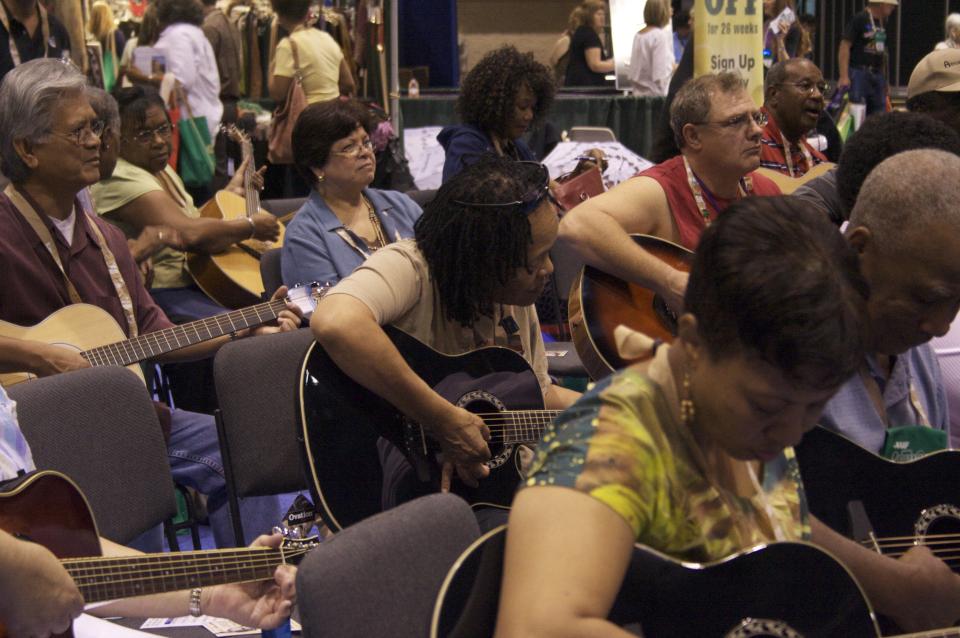
Music Making Helps Boomers Stay In the Groove
NAMM’s music making activities during Life @50+, the AARP National Event & Expo in New Orleans show how music helps to maintain the brain throughout life

With growing research evidence supporting music’s beneficial impact on the brain, leading advocates for healthy aging are encouraging past and present musicians to stick with their instruments or recommit to learning one. The therapeutic power of music will be put to the test this weekend (Sept. 20-22) at Life @50+, the AARP National Event & Expo in New Orleans, as the conference opens with a drum circle, attendees stop into the music making pavilion that will run throughout the show, and with the closing session that will feature the positive effects that music making has on the brain.
To demonstrate the interplay of rhythm on brain function, Mickey Hart, the longtime Grateful Dead percussionist and Trustee of American Folk Life Center, Library of Congress, will headline the closing session at AARP with neurologist Adam Gazzaley, M.D., Ph.D., a professor at the University of California, San Francisco. Dr. Gazzaley has extensively studied how the brain handles memory, attention and aging. The Life’s Rhythms Reimagined featured session will be held from 2 to 3:30 p.m., Saturday at the Ernest N. Morial Convention Center.
The interactive panel’s rhythm and brain health experts aim to “bang the drum” for additional research on the positive interplay between music and cognitive health. Introduced by Mary Luehrsen from the National Association of Music Merchants (NAMM), Saturday’s panel is a must-see feature at the annual AARP member conference.
NAMM also supports one of the most popular events at the AARP conference -- a hands-on music-making pavilion that includes an invigorating rhythm experience that will “drum” home the importance of music making to maintain a healthy brain throughout life.
Hart and Gazzaley’s session reinforces recent studies that show how playing a musical instrument can exercise and strengthen the aging brain. Scientists at Northwestern University’s Auditory Neuroscience Laboratory found that continuing to play music or take lessons functions as a sort of physical workout for the brain. The resulting “auditory fitness” can help us as we age to perceive speech and recognize sounds in noisy environments.
Playing music also has been shown to help compensate for age-related cognitive declines. A 2011 study by Brenda Hanna-Pladdy, a neuropsychologist at the Emory University School of Medicine Department of Neurology, confirmed that individuals with at least 10 years of instrumental musical training helped preserve cognitive benefits, including memory, as they aged.
While Hanna-Pladdy’s study looked at the later-in-life benefits of having learned a musical instrument as a child, her findings also suggest that it’s never too late to get involved in making music. Playing music in advanced age is also associated with maintaining visuospatial judgment and the ability to interpret and retain what one sees.
Media Contacts
NAMM Communications - John Dolak, Director
johnd@namm.org
619.735.4028
The Lippin Group for NAMM
namm@lippingroup.com
201.317.6618
About NAMM
The National Association of Music Merchants (NAMM) is the not-for-profit association with a mission to strengthen the $19.5 billion music products industry. NAMM is comprised of 15,400 global member companies and individual professionals with a global workforce of over 475,000 employees. NAMM events and members fund The NAMM Foundation's efforts to promote the pleasures and benefits of music and advance active participation in music-making across the lifespan. For more information about NAMM, please visit www.namm.org.